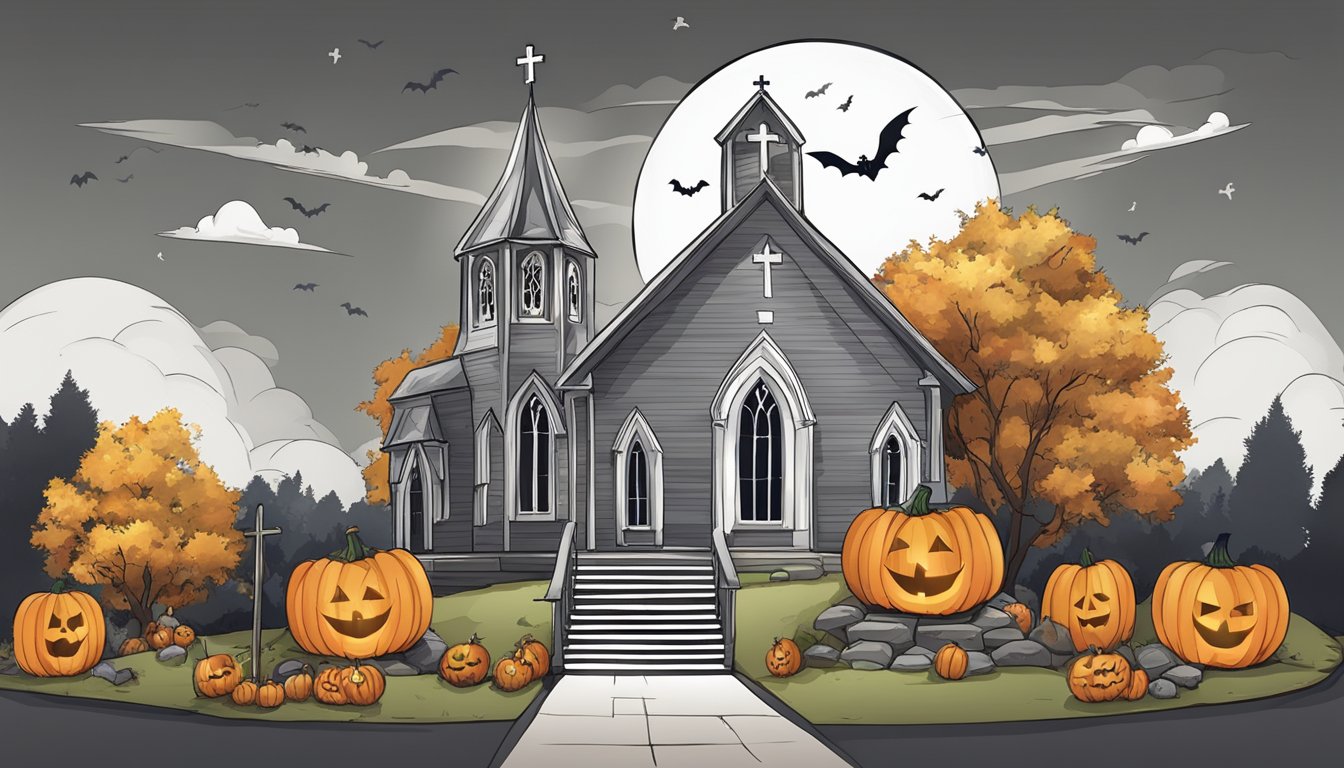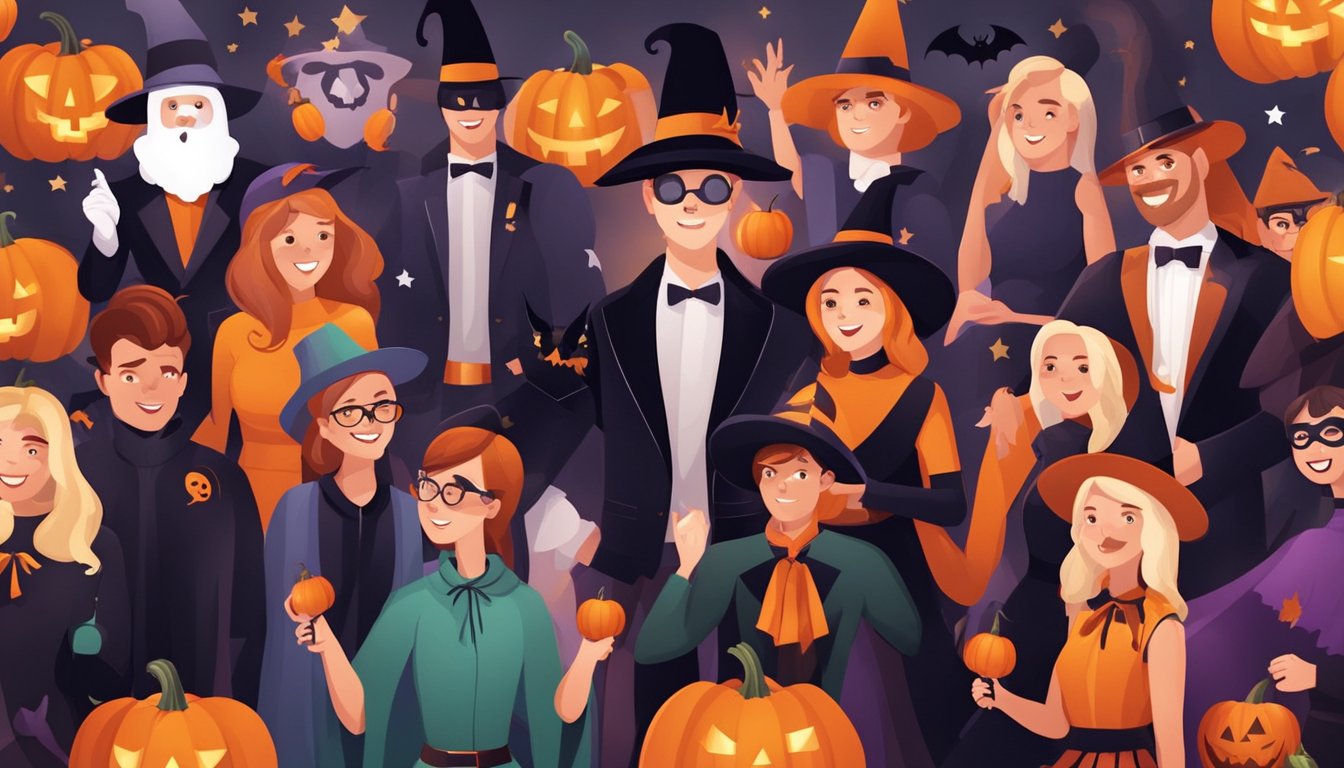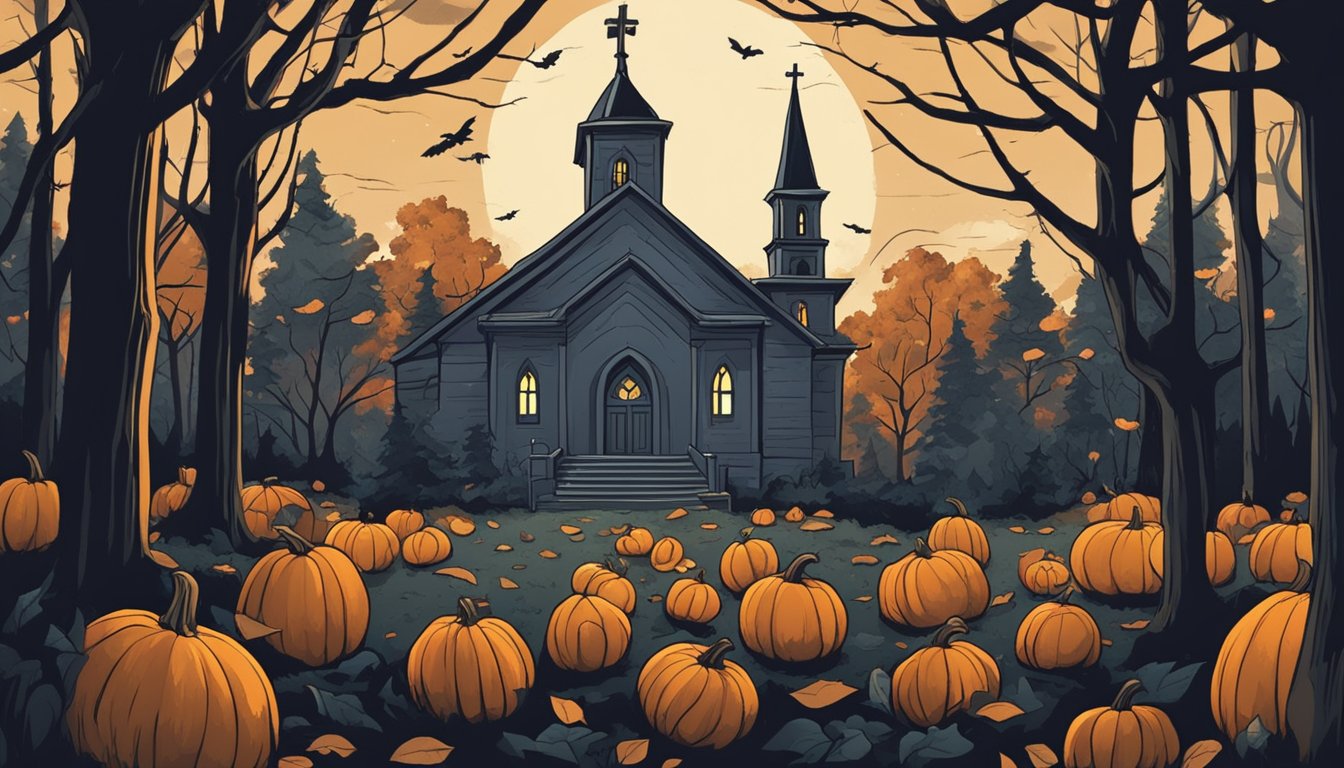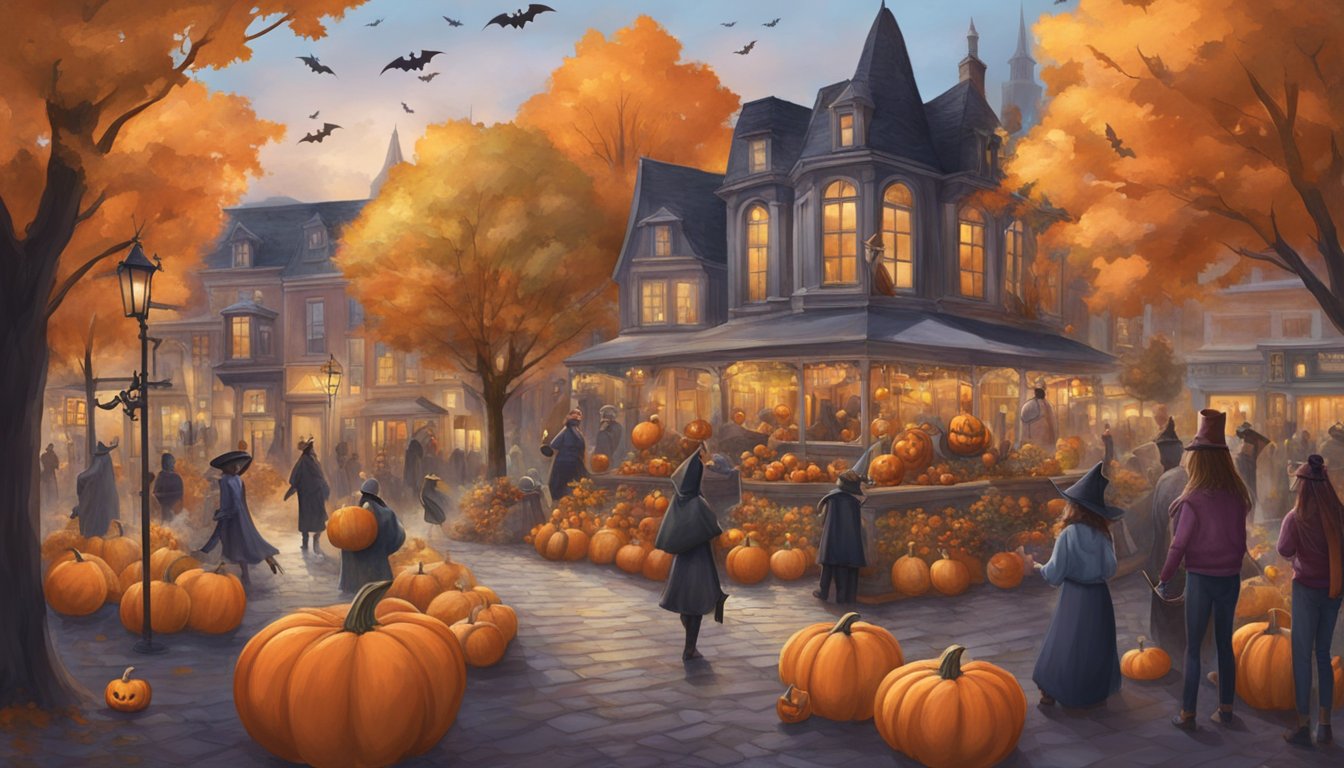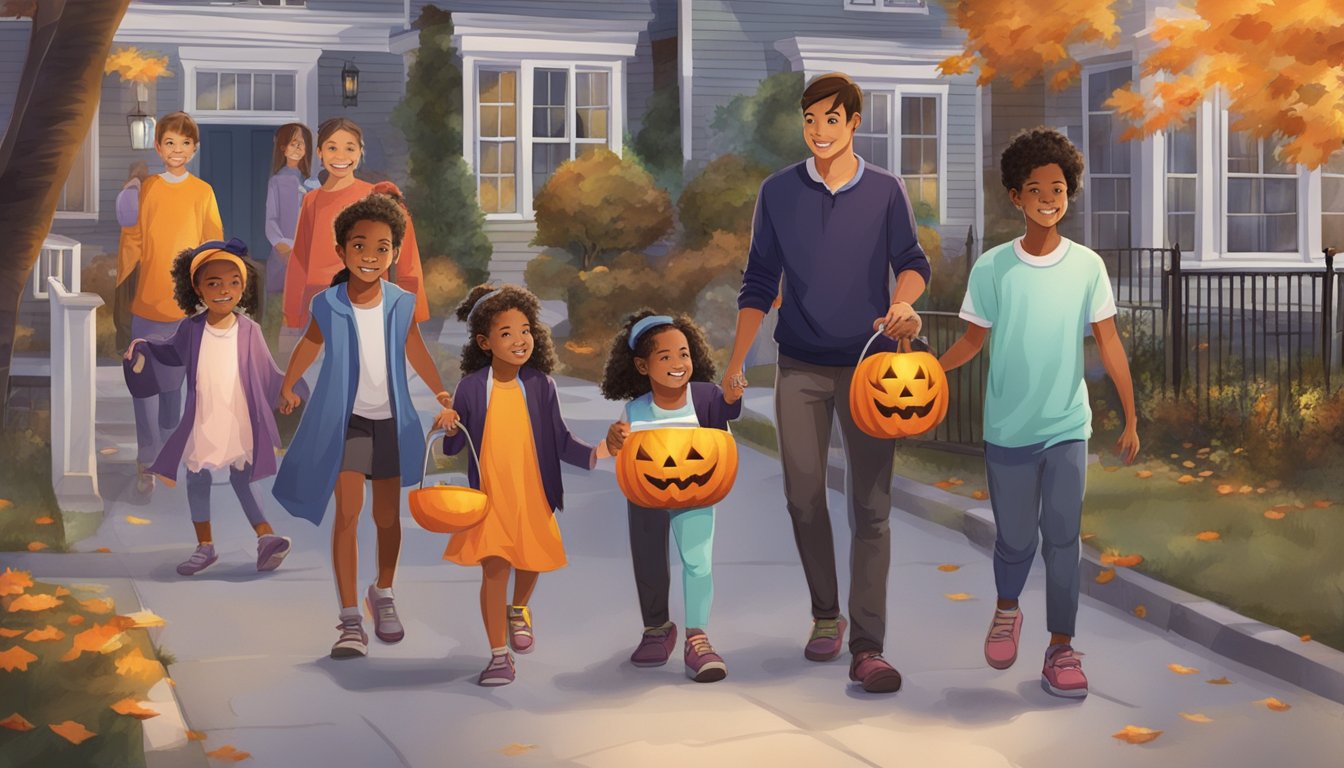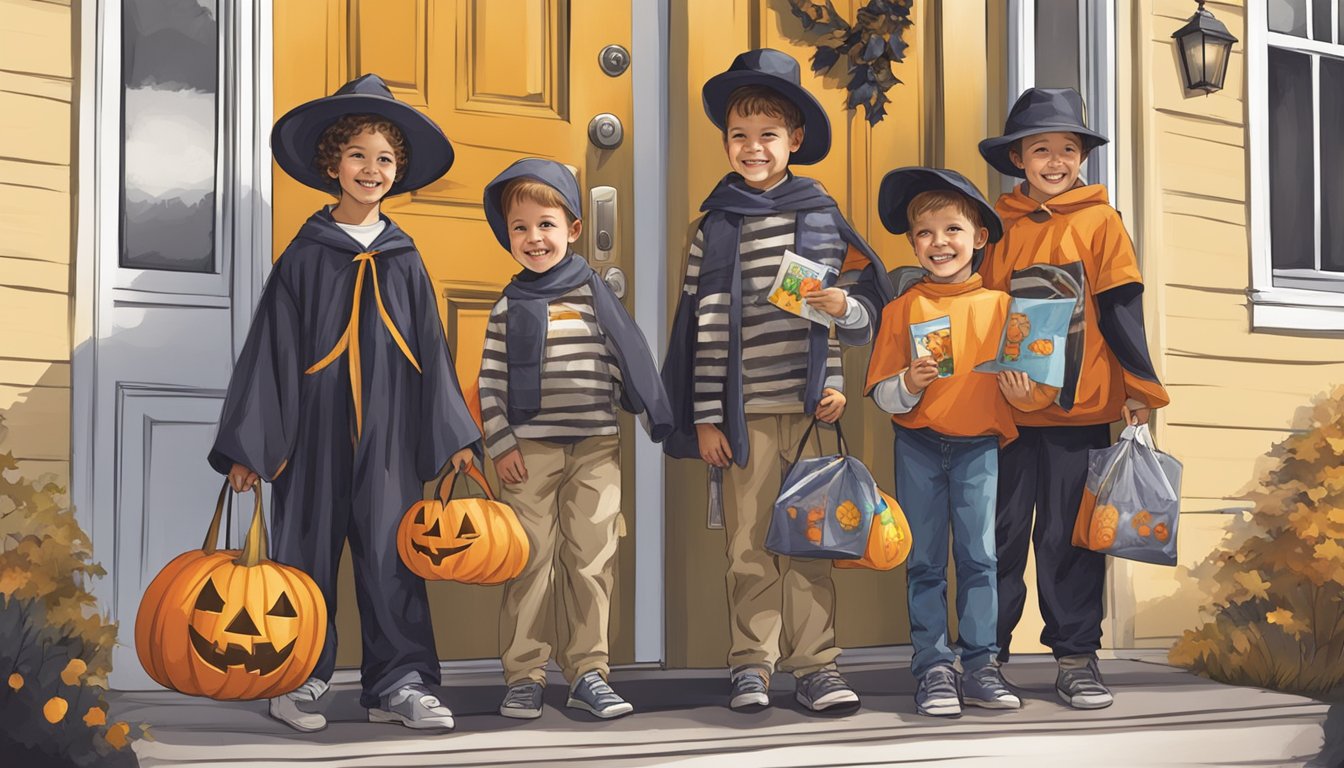Halloween is a holiday that is celebrated annually on October 31st. It is a holiday that is often associated with costumes, candy, and spooky decorations. However, there is much debate over whether or not Halloween is a Christian holiday. Some argue that Halloween has pagan roots and therefore should not be celebrated by Christians, while others believe that Halloween can be celebrated in a way that is consistent with Christian beliefs.

The debate over whether or not Halloween is a Christian holiday is complex and multifaceted. On one hand, Halloween has historical roots that are deeply rooted in pagan traditions. However, many Christians argue that Halloween has been adapted over time and can be celebrated in a way that is consistent with Christian beliefs. Ultimately, the answer to whether or not Halloween is a Christian holiday is a matter of personal belief and interpretation.
Key Takeaways
- Halloween has historical roots that are deeply rooted in pagan traditions.
- Christians have different perspectives on whether or not Halloween can be celebrated in a way that is consistent with Christian beliefs.
- Ultimately, the answer to whether or not Halloween is a Christian holiday is a matter of personal belief and interpretation.
The Historical Roots of Halloween
https://www.youtube.com/watch?v=ZVB5rPfWPtc&embed=true

Halloween is a holiday that has been celebrated for centuries, but its historical roots are somewhat murky. The holiday has been associated with both pagan and Christian traditions, and its origins can be traced back to ancient Celtic harvest festivals. In this section, we will explore the historical roots of Halloween, including its Celtic and pagan origins, as well as its Christian influence and connection to All Saints’ Day.
Celtic and Pagan Origins
Halloween, also known as All Hallows’ Eve, has its roots in the ancient Celtic festival of Samhain. Samhain was a harvest festival that marked the end of the summer and the beginning of the dark, cold winter. The Celts believed that on this night, the boundary between the living and the dead was blurred, and the spirits of the dead could return to the earth.
To ward off these spirits, the Celts would light bonfires and wear costumes and masks to disguise themselves. They also offered food and drink to the spirits, hoping to appease them and prevent them from causing harm. Over time, these traditions evolved into the modern-day customs of trick-or-treating and carving jack-o’-lanterns.
Christian Influence and All Saints’ Day
In the 8th century, Pope Gregory III declared November 1st as All Saints’ Day, a day to honor all the saints and martyrs of the Christian faith. This holiday was also known as All Hallows’ Day, and the night before it became known as All Hallows’ Eve, which eventually evolved into the modern-day Halloween.
The Christian influence on Halloween can be seen in the incorporation of All Saints’ Day and All Souls’ Day into the holiday. These days were set aside to honor the dead and pray for the souls of the departed, and they were celebrated with church services and processions.
Despite the Christian influence on Halloween, the holiday has retained many of its pagan origins and traditions. Today, Halloween is celebrated around the world with costumes, parties, and spooky decorations, and it remains a popular holiday that is enjoyed by people of all ages.
Biblical Perspectives on Halloween
https://www.youtube.com/watch?v=3T4RlGtQFGc&embed=true
Scriptural References to Pagan Practices
The Bible does not mention Halloween specifically, but it does address the issue of pagan practices. Deuteronomy 18:9-14 warns against participating in practices such as divination, witchcraft, and sorcery. These practices were common among the pagan nations that surrounded Israel, and God commanded His people to have nothing to do with them.
Christian Views on Darkness and Evil
Many Christians believe that Halloween celebrates darkness and evil, which are contrary to the teachings of Jesus Christ. They argue that the holiday glorifies death, witchcraft, and other practices that are associated with the devil. However, some Christians believe that Halloween can be redeemed and used as an opportunity to share the gospel.
Overall, the biblical perspectives on Halloween are varied and complex. While some Christians choose to avoid the holiday altogether, others use it as an opportunity to share the love of Christ with their neighbors. Regardless of one’s personal views on Halloween, it is important to remember that our ultimate allegiance is to Jesus Christ and His teachings.
Modern Halloween Celebrations

Halloween has evolved into a secular holiday that is celebrated by people of all ages, religions, and backgrounds. It is a time for dressing up in costumes, trick-or-treating, and attending parties with friends and family. In this section, we will explore some of the most common ways that people celebrate Halloween today.
Trick-or-Treating and Costumes
Trick-or-treating is a popular Halloween tradition where children dress up in costumes and go door-to-door in their neighborhood asking for candy. Many families enjoy this tradition as a way to bond with their neighbors and create lasting memories with their children. It is important to remember to practice safety when trick-or-treating, such as wearing reflective clothing and carrying a flashlight.
Costumes are a key part of Halloween celebrations. People of all ages enjoy dressing up as their favorite characters, animals, or objects. Some people choose to make their own costumes, while others purchase them from stores or online retailers. It is important to remember that costumes should be safe and appropriate for all ages.
Halloween Parties and Social Gatherings
Halloween parties and social gatherings are another popular way to celebrate the holiday. People often decorate their homes with spooky decorations and serve Halloween-themed food and drinks. Halloween parties are a great way to spend time with friends and family and create lasting memories.
It is important to remember to practice safety when attending Halloween parties. If you are serving alcohol, make sure to do so responsibly and provide non-alcoholic options for guests. It is also important to remember to practice social distancing and follow any local guidelines or restrictions related to COVID-19.
« Is “Name of Love” a Christian Song? Exploring the Religious Themes in the Hit Single
Is a Christian a Saint? Exploring the Relationship Between Christianity and Sainthood »
In conclusion, Halloween is a time for celebration, fun, and creating lasting memories with friends and family. Whether you are trick-or-treating, dressing up in costumes, or attending a Halloween party, it is important to remember to practice safety and have fun.
Christian Responses to Halloween
https://www.youtube.com/watch?v=PSTWcpgmOqw&embed=true
Churches and Alternative Celebrations
Many Christian churches have mixed opinions on Halloween. Some churches view it as a harmless holiday for children to dress up and have fun, while others view it as a pagan holiday that should be avoided. Some churches choose to hold alternative celebrations, such as “Trunk or Treat” events, where children can receive candy from decorated car trunks in a safe and controlled environment.
Evangelical and Conservative Opinions
Evangelical and conservative Christians often have stronger opinions on Halloween. Some view it as a celebration of darkness and evil, and believe that Christians should not participate in any way. Others believe that Halloween can be redeemed and used as an opportunity to share their faith with others.

Pat Robertson, founder of the Christian Broadcasting Network, has been outspoken about his opposition to Halloween. He has called it a “Satanic holiday” and advised Christians to avoid it altogether. On the other hand, Martin Luther, the father of the Reformation, believed that Christians should celebrate Halloween by mocking the devil and his demons.
In conclusion, the Christian response to Halloween varies greatly, and is often based on personal convictions and church traditions. While some choose to avoid the holiday altogether, others choose to embrace it as an opportunity to share their faith and celebrate in a safe and controlled environment.
Theological Implications of Halloween
Halloween is a holiday that has been celebrated for centuries, but its theological implications are a topic of debate among Christians. While some Christians view Halloween as a harmless celebration, others view it as a holiday that glorifies evil and death. In this section, we will explore the theological implications of Halloween and how Christians can approach this holiday.
Dealing with the Concepts of Death and Evil
One of the main theological implications of Halloween is its association with death and evil. The holiday is often associated with ghosts, goblins, and other supernatural entities that are considered evil or scary. Some Christians believe that celebrating Halloween is a way of glorifying evil and death, which goes against the teachings of the Bible.

However, other Christians argue that Halloween can be an opportunity to confront these concepts in a healthy way. By dressing up as scary characters or decorating their homes with spooky decorations, Christians can confront their fears and acknowledge the reality of death and evil in the world. This can also be a way of celebrating the victory of Christ over death and evil, as Christians believe that Christ has conquered death and the powers of darkness.
The Christian Perspective on Fear and the Occult
Another theological implication of Halloween is its association with fear and the occult. Some Christians believe that participating in Halloween activities that involve the occult, such as fortune-telling or witchcraft, is a violation of Biblical teachings. The Bible warns against participating in such activities and associating with evil spirits and demons.
However, other Christians argue that Halloween can be a way of confronting fear and the occult in a safe and healthy way. By dressing up as witches or other supernatural characters, Christians can acknowledge the reality of the occult and confront their fears in a controlled environment. This can also be a way of celebrating the victory of Christ over the powers of darkness.
In conclusion, the theological implications of Halloween are a topic of debate among Christians. While some view Halloween as a harmless celebration, others view it as a holiday that glorifies evil and death. However, by approaching Halloween with discernment and a Christian perspective, Christians can confront their fears and acknowledge the reality of death and evil in the world.
Cultural Impact of Halloween on Society
Influence on Children and Families

Halloween has become one of the most celebrated holidays in the United States. It has a significant impact on children and families, who eagerly await the holiday each year. For children, Halloween is a time to dress up in costumes and collect candy from neighbors. Parents often join in on the fun, dressing up and decorating their homes.
However, the holiday can also be a source of concern for some parents. They worry about the safety of their children while trick-or-treating, and about the influence of Halloween on their children’s values. Some parents believe that Halloween promotes a culture of materialism and greed, as children focus on collecting as much candy as possible.
Commercialization and Economic Aspects
Halloween has also become a major commercial holiday. The holiday generates significant revenue for businesses, particularly those in the costume and candy industries. Halloween spending in the United States has reached billions of dollars each year, with consumers purchasing costumes, decorations, and candy.
The commercialization of Halloween has also led to criticism from some who believe that the holiday has lost its true meaning. Some argue that Halloween has become too focused on materialism and consumerism, rather than on its cultural and religious roots.
Overall, Halloween has had a significant impact on American culture and society. While it is a time of fun and celebration for many, it is also a time of concern for some parents and critics. The holiday’s commercialization has also led to debates about its true meaning and significance.
Spiritual Practices and Halloween

https://www.youtube.com/watch?v=Sb6Qkl3Cijg&embed=true
Alternative Spiritual Celebrations
For Christians who are uncomfortable with the secular aspects of Halloween, there are alternative spiritual celebrations. Some churches host “Fall Festivals” or “Harvest Parties” as a way to provide a safe and fun environment for children to dress up and enjoy games and treats. These events often include activities that focus on the Christian faith, such as Bible stories, songs, and crafts.
Another alternative is to celebrate All Saints’ Day, which falls on November 1st. All Saints’ Day is a Christian holiday that honors all the saints, both known and unknown, who have attained heaven. It is a time to remember and give thanks for the lives of those who have gone before us and to reflect on the Christian faith.
Christian Discernment and Participation
For those who choose to participate in Halloween, it is important to exercise Christian discernment. Christians are called to be in the world but not of the world, and this means being mindful of the spiritual implications of their actions.
It is important to remember that Halloween has roots in pagan rituals and that some of the costumes and decorations may be associated with dark or demonic themes. Christians should avoid anything that glorifies evil or promotes fear, violence, or death.

Instead, Christians can use Halloween as an opportunity to show love, sacrifice, and truth. They can be a light of Christ in their neighborhoods by offering treats that are wholesome and by sharing the message of the Christian faith. They can also use Halloween as a time to pray for their neighbors and to reach out to those who may be struggling with spiritual issues.
Overall, Christians can approach Halloween with discernment and participate in ways that are consistent with their faith. By focusing on the spiritual aspects of the holiday, Christians can use Halloween as an opportunity to reflect on the Christian faith and to share the love of Christ with others.
Halloween Around the World
https://www.youtube.com/watch?v=TGiEW6dQTac&embed=true
Global Variations of Halloween Traditions
Halloween is a holiday that is celebrated in many countries around the world. Although the traditions and customs may differ, the underlying theme of the holiday remains the same – honoring the dead. In Europe, particularly in the British Isles, Halloween is celebrated as a time to ward off evil spirits and to prepare for the winter season.
In the United States, Halloween is celebrated on October 31st with costumes, trick-or-treating, and haunted houses. It has become a major cultural event and a big business opportunity for retailers.

In other parts of the world, Halloween is celebrated in different ways. In Mexico, for example, the Day of the Dead (Dia de los Muertos) is celebrated on November 1st and 2nd. It is a time to remember and honor deceased loved ones with colorful altars, parades, and offerings of food and drink.
In China, the Hungry Ghost Festival is celebrated in August or September. It is a time to honor the dead and to offer them food and drink. In some parts of Africa, the Day of the Dead is celebrated with music, dancing, and offerings of food and drink.
Adaptations of Halloween in Different Cultures
Although Halloween is primarily a Western holiday, it has been adapted and adopted by many different cultures around the world. In Japan, for example, Halloween is celebrated with costumes, parties, and parades. However, the focus is more on the fun and playful aspects of the holiday rather than the scary and spooky.
In India, Halloween is celebrated as a time to honor the goddess Kali. It is a time to celebrate the triumph of good over evil and to offer prayers and offerings to the goddess.
In some African countries, Halloween is celebrated as a time to remember and honor deceased loved ones. It is a time to offer prayers and offerings of food and drink to the dead.

Overall, Halloween is a holiday that has been adapted and adopted by many different cultures around the world. Although the traditions and customs may differ, the underlying theme of the holiday remains the same – honoring the dead.
Safety and Ethics of Halloween Celebrations
Safety Guidelines for Trick-or-Treating
Trick-or-treating is a popular activity during Halloween, especially among children. It is important to follow safety guidelines to ensure that everyone has a fun and safe experience. Here are some safety tips for trick-or-treaters:
- Always go trick-or-treating with an adult or in a group.
- Wear costumes that are visible and do not obstruct vision or movement.
- Use reflective tape or carry a flashlight to increase visibility.
- Only visit houses that have their porch lights on and never enter a stranger’s house or car.
- Do not eat any candy until it has been inspected by an adult.
Parents and homeowners can also take steps to ensure a safe trick-or-treating experience. Homeowners should make sure that their property is well-lit and free of any tripping hazards. Parents should also inspect their children’s candy for any signs of tampering before allowing them to eat it.
Ethical Considerations of Halloween Activities
While Halloween is a fun and festive holiday, it is important to consider the ethical implications of certain activities. For example, some costumes may be offensive or culturally insensitive. It is important to choose costumes that are respectful and do not perpetuate harmful stereotypes.

Additionally, some Halloween activities may promote violence or harm. It is important to avoid any activities that could potentially harm others or cause damage to property. Instead, focus on community-building activities such as pumpkin carving or a costume contest.
By following these safety guidelines and ethical considerations, everyone can enjoy a fun and safe Halloween celebration.
Halloween and Christian Outreach
Halloween is a popular holiday that is celebrated by millions of people around the world. While some Christians believe that Halloween is a pagan holiday that should be avoided, others see it as an opportunity to reach out to their communities with the gospel.
Using Halloween as an Outreach Opportunity
Many churches use Halloween as an opportunity to reach out to their communities with the gospel. They may host events such as trunk-or-treats, fall festivals, or harvest parties that provide a safe and fun environment for families to celebrate the holiday. These events often include games, food, and other activities that are designed to appeal to children and families.
By hosting these events, churches are able to connect with their communities and share the love of Christ with those who may not attend church regularly. They are also able to build relationships with families and individuals who may be seeking spiritual guidance or support.
Balancing Celebration with Evangelism
While Halloween can be a great opportunity for Christian outreach, it is important to balance celebration with evangelism. Christians should be careful not to compromise their faith by participating in activities that are contrary to their beliefs. They should also be mindful of the message that they are sending to those around them.
One way to balance celebration with evangelism is to focus on the message of the cross. Christians can use Halloween as an opportunity to share the gospel message with those around them. They can also use the holiday as a time to reflect on the victory that Christ has won over sin and death.
Overall, Halloween can be a great opportunity for Christian outreach and evangelism. By using the holiday as an opportunity to connect with their communities and share the love of Christ, Christians can make a positive impact in the lives of those around them.
Frequently Asked Questions
https://www.youtube.com/watch?v=ntuBoKzVX24&embed=true
What is the history of Halloween in Christian tradition?
Halloween has its roots in the ancient Celtic festival of Samhain, which was celebrated on the night of October 31st. The festival marked the end of the harvest season and the beginning of the dark, cold winter, a time of year that was often associated with death. The Celts believed that on the night of Samhain, the boundary between the living and the dead became blurred, and ghosts and other supernatural entities could cross over into the world of the living.
Over time, the Catholic Church adapted the festival of Samhain into the Christian holiday of All Saints’ Day, which is also known as All Hallows’ Day. The evening before All Saints’ Day became known as All Hallows’ Eve, which eventually became shortened to Halloween.
Can Halloween be celebrated in a way that aligns with Christian values?
Yes, Halloween can be celebrated in a way that aligns with Christian values. Many Christians choose to celebrate Halloween as a time to remember and honor deceased loved ones, and to reflect on the Christian belief in the afterlife. Some churches even hold special services on Halloween, such as All Saints’ Day vigils or Halloween alternative events.
What are the Biblical perspectives on participating in Halloween festivities?
The Bible does not specifically address the issue of participating in Halloween festivities. However, Christians are called to live in a way that honors God and reflects their faith. Therefore, Christians should carefully consider how they celebrate Halloween and make sure that their actions align with their values and beliefs.
How can I explain the meaning of Halloween to my Christian child?
Parents can explain the meaning of Halloween to their Christian child by discussing the history and traditions of the holiday, and by emphasizing the importance of honoring God in all aspects of their lives. Parents can also use Halloween as an opportunity to teach their child about the Christian belief in the afterlife, and to reflect on the lives of deceased loved ones.
Does celebrating Halloween go against Catholic beliefs?
Celebrating Halloween does not go against Catholic beliefs, as long as the celebration is conducted in a way that aligns with Catholic values and beliefs. Many Catholics choose to celebrate Halloween as a time to remember and honor deceased loved ones, and to reflect on the Christian belief in the afterlife.
What do different Christian denominations say about observing Halloween?
Different Christian denominations have varying perspectives on observing Halloween. Some denominations, such as Baptists and Pentecostals, discourage or even forbid participation in Halloween festivities. Other denominations, such as Catholics and Anglicans, embrace the holiday as a time to remember and honor deceased loved ones. Ultimately, Christians should carefully consider their own beliefs and values when deciding how to observe Halloween.

